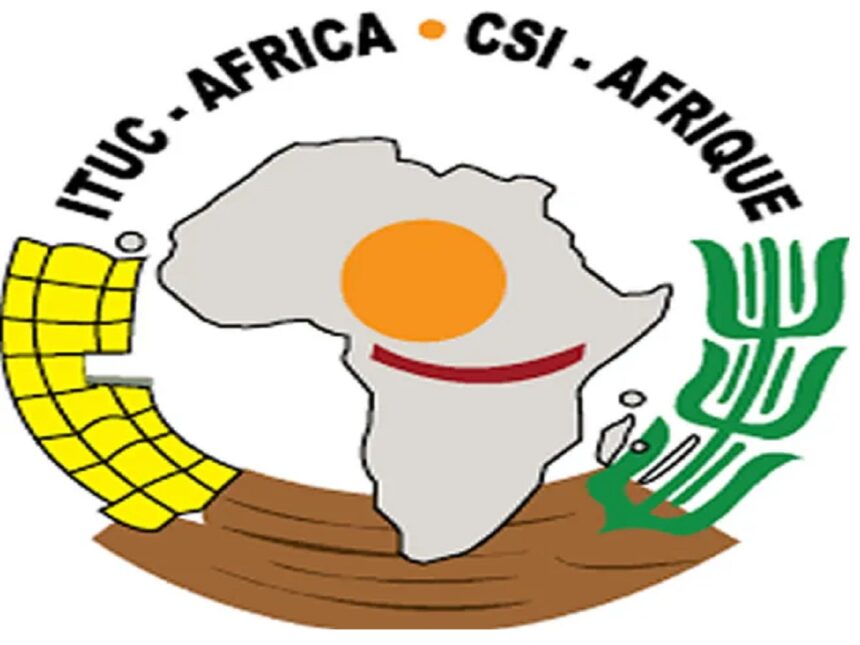…urges African govts to heed citizen’s call, initiate transformative reforms
The African Regional Organisation of the International Trade Union Confederation (ITUC-Africa) has attributed the increasing wave of public protests sweeping through some African countries to the deepening cost of living crisis, surging unemployment, and systemic political exclusion.
This was contained in a statement issued by its General Secretary, Akhator Joel Odigie, the organisation warned that repression and silence in the face of citizens’ anguish will only deepen the crisis and erode peace.
“The surge in protests is driven by spiralling living costs, rising inequality, lack of decent jobs and surging unemployment, and political exclusion,” the statement declared. “Governments must therefore refrain from repression, instead honouring their constitutional duty to safeguard peaceful assembly and creating genuine channels for engagement.”
Odigie emphasised that protests in Africa is not a crime but a democratic right through which the people express their frustrations and push for change. “It is a democratic right and a legitimate channel through which citizens voice grievances, demand accountability, and help shape decisions that affect their lives,” he said. “This right is protected by national constitutions, the African Charter on Human and Peoples’ Rights, and international instruments such as the International Covenant on Civil and Political Rights.”
ITUC-Africa, which represents over 17 million workers in 52 African countries, said it is deeply concerned about the growing frequency and intensity of protests across Africa, pointing out that these events mirror the “mounting socio-economic distress and political dissatisfaction felt by millions of citizens.”
Reiterating the organisation’s stance, Odigie stated: “We affirm that ‘the voice of the people is the voice of God (Vox Populi, Vox Dei). We ask governments to heed the calls of the people because they are the collective conscience of the nations.”
He called on African governments to act with humility, urgency and sincerity by engaging in meaningful reforms and inclusive dialogue with their citizens. “Governments have a constitutional duty not only to listen with humility and urgency, but also to respond through meaningful action, inclusive dialogue, and reforms that reflect the legitimate demands of their citizens,” he said.
The union leader stressed the need to replace confrontation with cooperation through genuine social dialogue rooted in respect and participation. “Dialogue grounded in trust, respect, and participation is the most sustainable path to resolve conflicts, bridge divisions, and craft equitable solutions. Citizens are partners in nation-building, not adversaries,” he maintained.
As a pan-African voice for labour and democracy, ITUC-Africa also urged citizens and protesters to remain peaceful and eschew violence. “No cause is advanced by chaos, plunder or lawlessness,” the statement warned.
The organisation further called on security forces and judicial institutions to uphold the rule of law, stressing that their impartiality is critical to maintaining public trust. It said that social partners—trade unions, employers, and civil society—must champion social dialogue as the most effective way to achieve reform and national cohesion.
Odigie concluded by underscoring that “peace is not the absence of protest. It is the presence of justice. Enduring peace and stability cannot be imposed by silence or force but must be built on inclusive governance, economic justice, and unfailing respect for human dignity. Ignoring citizens’ voices deepens discontent; listening and responding through social dialogue opens the way to shared solutions and lasting peace.”
ALSO READ TOP STORIES FROM NIGERIAN TRIBUNE
WATCH TOP VIDEOS FROM NIGERIAN TRIBUNE TV
- Let’s Talk About SELF-AWARENESS
- Is Your Confidence Mistaken for Pride? Let’s talk about it
- Is Etiquette About Perfection…Or Just Not Being Rude?
- Top Psychologist Reveal 3 Signs You’re Struggling With Imposter Syndrome
- Do You Pick Up Work-Related Calls at Midnight or Never? Let’s Talk About Boundaries






